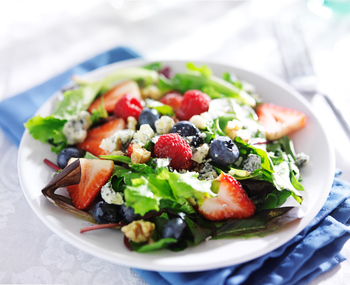https://www.caring.com/articles/the-mind-diet
How Changing Your Diet Even Moderately May Help Prevent Alzheimer's Disease

A salad day could help keep Alzheimer's at bay.
According to a new diet that’s been shown to help prevent Alzheimer’s, you might want to add them in bulk quantity to your weekly grocery list. Throw in a few bags of nuts as well.
When I first heard about the MIND diet (MIND is an acronym that blends the Mediterranean and DASH -- Dietary Approaches to Stop Hypertension), my first thought was, does the world really need another diet?
There seems to be a new one on the bestseller list every week. One promises weight loss, another longevity. Many of the basic precepts are the same – portion control, natural vs. processed foods, more fish than red meat, vegetables and fruits vs. simple carbs and sugary desserts.
What makes the MIND Diet different?
I asked Dr. Martha Clare Morris, a nutritional epidemiologist at Rush University Medical Center in Chicago and lead scientist on the study that produced this diet, how this one differs from others.“There’s been very limited data on diet interventions for people related to preventing brain degeneration,” she says. “There’s about 20 years of literature for nutrients that specifically protect the brain, including a study we published in 2002 on antioxidant nutrients in relation to Alzheimer’s disease, so the evidence is relatively new.”
The evidence may be new, but the results are clear, according to Morris. “The MIND diet reduced the risk of Alzheimer’s by about 53% in our study participants,” she says.
First published in the journal Alzheimer’s & Dementia: The Journal of the Alzheimer’s Association earlier this year, the MIND diet reported on 923 participants aged 58-98, who were observed over 4.5 years on average.
Which Foods Does the MIND Diet Include?
“The MIND diet specifically breaks out green leafy vegetables as the best kind of vegetable, at least a serving a day, plus berries and any type of nut,” Morris says. “There’s no recommendation for fruits as a general category since there’s no evidence that eating fruit protects the brain. There are also no recommendations for dairy and salt.”Rush University provides more specifics on the diet, including which foods to eat – such as fish, olive oil, whole grains and the aforementioned leafy green vegetables, berries and nuts – and which to avoid – such as butter, red meat, fried food, cheese and sugary sweets.
Who’s a candidate for the diet?
The short answer: anyone concerned about the risk of developing Alzheimer’s disease. With the growing awareness and concern in the United States about the prevalence of Alzheimer’s, people are eager for preventive measures.Dr. Morris’s research doesn’t make it easy for those wanting personalized predictions. Based on the data, there were no differences in results by age, gender, socioeconomic, or other factors.
For example, Morris doesn’t suggest at what age people should get serious about diets aimed at preventing cognitive decline. “We don’t know the timing,” she says. Instead, she adopts the view taken by many in the medical world, and repeats a familiar mantra I’ve heard more than once from my own doctor. “As with all diet, exercise and weight maintenance, the earlier the better,” she says.
Moderation works, too
"Diet" is a scary word for most of us. We go on a diet with all the fervency of a new year’s resolution made on December 31, but typically, our resolve and commitment wanes fast. If you’re considering adopting the MIND diet, you might be encouraged by the fact that even moderate adherence can make a positive difference, according to the research conducted by the creators of this Alzheimer's prevention diet. A healthy 35% of “partial adopter” participants also showed reduced risk for developing Alzheimer’s.“Our approach is more moderate and easier to follow,” Morris says. “You don’t have to adjust your lifestyle quite as much as with other diets. Having a salad, some type of vegetable you like, and a few nuts every day isn’t hard to manage for most people.”
Dr. Morris has been stunned by the reaction to her findings. Apparently, the diet-saturated world was ready for another one. “There’s been no pushback,” she says. “The diet has been embraced worldwide by both the scientific and worldwide communities. There’s a huge need for diet recommendations for disease since people are so afraid of Alzheimer’s.”
Based on the positive reaction and results, Dr. Morris and her team plan to continue their work in 2016 with a new study delving even deeper into unlocking the nutritional mysteries of cognitive function.
No comments:
Post a Comment